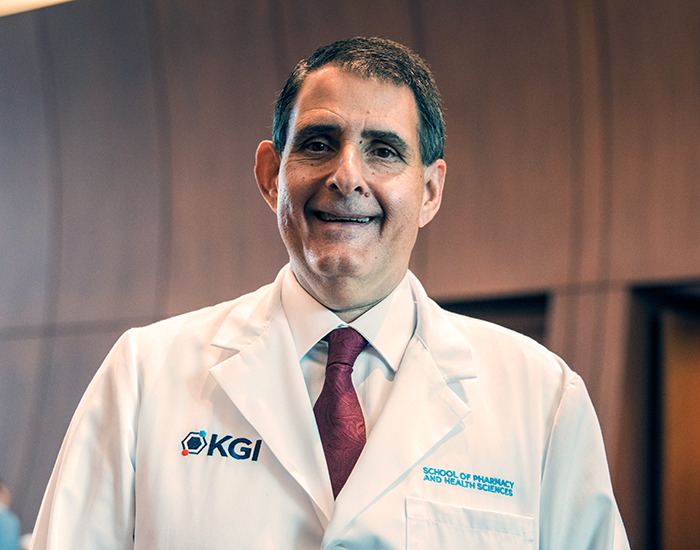Keck Graduate Institute (KGI) School of Pharmacy and Health Sciences (SPHS) Dean Dr. Martin Zdanowicz and the school’s faculty have designed a new Doctor of Pharmacy (PharmD) curriculum that will combine basic science courses and clinical courses into integrated sequence courses. The decision was motivated by feedback from students and faculty as well as standardized test scores and exam outcomes.
Currently, the program's curriculum is a mix of intensive short block courses and longitudinal courses that run over the full semester; foundational science content like Physiology, Medicinal Chemistry, and Pharmacology is taught independently from clinical content.
Conversely, the new integrated sequence courses will combine the foundational science content with the clinical and therapeutic content for each disease state and organ system. For example, if the students are studying Cardiology, in the morning they'll get the pathophysiology of a particular disease and then learn about the drugs to treat that disease and the chemistry and mechanism of the drugs. That same day, they'll also have clinical faculty come in to talk about how to use the drugs safely and effectively in various patient populations. In this way, the basic science topics serve as the foundation upon which the clinical topics are built.
“This integrated approach will be advantageous to students because it helps students understand how all of these topics are tied together and allows them to see the big picture,” said Zdanowicz.
“It also enables the students to draw upon and utilize their foundational science knowledge and apply it in a clinical context.”
The other purpose of this curricular change is to expose students to clinical content earlier in the curriculum. Currently students do not see significant clinical content until their second year, but with the new curriculum, they will be exposed to the content in the fall of their first year.
"We have also added weekly case-based recitation sessions that are designed to foster student critical thinking and longitudinal learning," Zdanowicz said.
The new curriculum will launch in fall of 2020. While it is directed at first-year PharmD students, a number of curriculum changes for current students will parallel some of the features seen in the new curriculum, such as a movement to all longitudinal courses and the addition of case-based recitation sessions.
Zdanowicz came to KGI in August 2019 following seven years in a leadership role at the University of Miami. What drew him to KGI was the intimate environment, commitment to innovation, and the caring, supportive faculty.
Not only does Zdanowicz have experience in leadership and curriculum design, but he has also won eight awards for his teaching. He believes that when it comes to effective teaching, emphasizing the practical application of the knowledge is key.
"You need to demonstrate to the students why this content is important and how it applies to clinical practice," Zdanowicz said. "Even if you're teaching a subject like biochemistry, you can always bring the content back to clinical practice and connect it to the patient."
In each classroom, there will be students with a variety of learning styles. Therefore, Zdanowicz believes it is imperative to utilize a variety of different active learning techniques to fully engage all students. Above all, professors must be flexible and open to change in order to meet the diverse needs of students.
KGI is seeing many changes in the upcoming year. In addition to the redesigned PharmD curriculum, there is a new Entry-Level Occupational Therapy Doctorate (OTD) program in development and the KGI School of Medicine is in its early planning stages.
"There are many changes in the works, but I think they're all good, and ones that really complement one another," Zdanowicz said. "I believe these changes will make us a much stronger school and one that is better positioned to continue providing the innovative and high quality education that will allow our students to go out and do great things."
